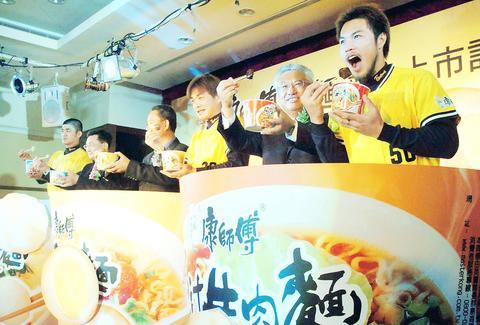Wei Chuan Foods Corp (
"Our target is to raise market share to 25 percent at the end of this year," chairman Wei Ying-chun (

PHOTO: CHIANG YING-YING, TAIPEI TIMES
The new noodles sell for NT$25 a pack, demonstrating a different marketing strategy from the low-priced tactics employed when Master Kong entered the local market at the end of 2002.
But Wei Chuan may find it hard to achieve its goal, said Rachel Lee (
Several famous products, like the ground-pork noodles (
"As consumption will not dramatically expand in this mature sector, the company must develop unique flavors of noodles," she said.
Lee noted that Wei Chuan's low-price marketing strategy did not really work -- despite causing shock waves at the beginning -- as it had slashed margins by 4 percent when sales of Master Kong fell short of targets.
"Therefore, it turned around to seize the medium- and high-priced noodle market," she said.
According to ACNielsen Taiwan's statistics, Uni-President accounted for 46 percent of the nation's NT$8.42 billion instant-noodle market from May last year to last month, down 3 percent from a year earlier.
It was ranked the No.1 noodle brand last month in major retail channels, including supermarkets, convenience stores and mom-and-pop shops, the report said.
It was followed by Wei Lih, which held 20 percent, and Vedan Enterprise (味丹企業) and Master Kong with around 12 percent each.
Master Kong has been refused access to the more than 3,500 7-Eleven outlets owned by Uni-President's subsidiary President Chain Store Corp (
"But we'll work harder so that 7-Eleven will find it difficult to reject our products," Su said.
Admitting that Master Kong's market share has declined by between 5 percent and 10 percent since December because no innovative products were launched, Su expressed optimism about another shake-up in the market.
"We hope to jump to second place to compete head-to-head with Uni-President," Su said.

TAKING STOCK: A Taiwanese cookware firm in Vietnam urged customers to assess inventory or place orders early so shipments can reach the US while tariffs are paused Taiwanese businesses in Vietnam are exploring alternatives after the White House imposed a 46 percent import duty on Vietnamese goods, following US President Donald Trump’s announcement of “reciprocal” tariffs on the US’ trading partners. Lo Shih-liang (羅世良), chairman of Brico Industry Co (裕茂工業), a Taiwanese company that manufactures cast iron cookware and stove components in Vietnam, said that more than 40 percent of his business was tied to the US market, describing the constant US policy shifts as an emotional roller coaster. “I work during the day and stay up all night watching the news. I’ve been following US news until 3am

UNCERTAINTY: Innolux activated a stringent supply chain management mechanism, as it did during the COVID-19 pandemic, to ensure optimal inventory levels for customers Flat-panel display makers AUO Corp (友達) and Innolux Corp (群創) yesterday said that about 12 to 20 percent of their display business is at risk of potential US tariffs and that they would relocate production or shipment destinations to mitigate the levies’ effects. US tariffs would have a direct impact of US$200 million on AUO’s revenue, company chairman Paul Peng (彭雙浪) told reporters on the sidelines of the Touch Taiwan trade show in Taipei yesterday. That would make up about 12 percent of the company’s overall revenue. To cope with the tariff uncertainty, AUO plans to allocate its production to manufacturing facilities in

Six years ago, LVMH’s billionaire CEO Bernard Arnault and US President Donald Trump cut the blue ribbon on a factory in rural Texas that would make designer handbags for Louis Vuitton, one of the world’s best-known luxury brands. However, since the high-profile opening, the factory has faced a host of problems limiting production, 11 former Louis Vuitton employees said. The site has consistently ranked among the worst-performing for Louis Vuitton globally, “significantly” underperforming other facilities, said three former Louis Vuitton workers and a senior industry source, who cited internal rankings shared with staff. The plant’s problems — which have not

COLLABORATION: Given Taiwan’s key position in global supply chains, the US firm is discussing strategies with local partners and clients to deal with global uncertainties Advanced Micro Devices Inc (AMD) yesterday said it is meeting with local ecosystem partners, including Taiwan Semiconductor Manufacturing Co (TSMC, 台積電), to discuss strategies, including long-term manufacturing, to navigate uncertainties such as US tariffs, as Taiwan occupies an important position in global supply chains. AMD chief executive officer Lisa Su (蘇姿丰) told reporters that Taiwan is an important part of the chip designer’s ecosystem and she is discussing with partners and customers in Taiwan to forge strong collaborations on different areas during this critical period. AMD has just become the first artificial-intelligence (AI) server chip customer of TSMC to utilize its advanced